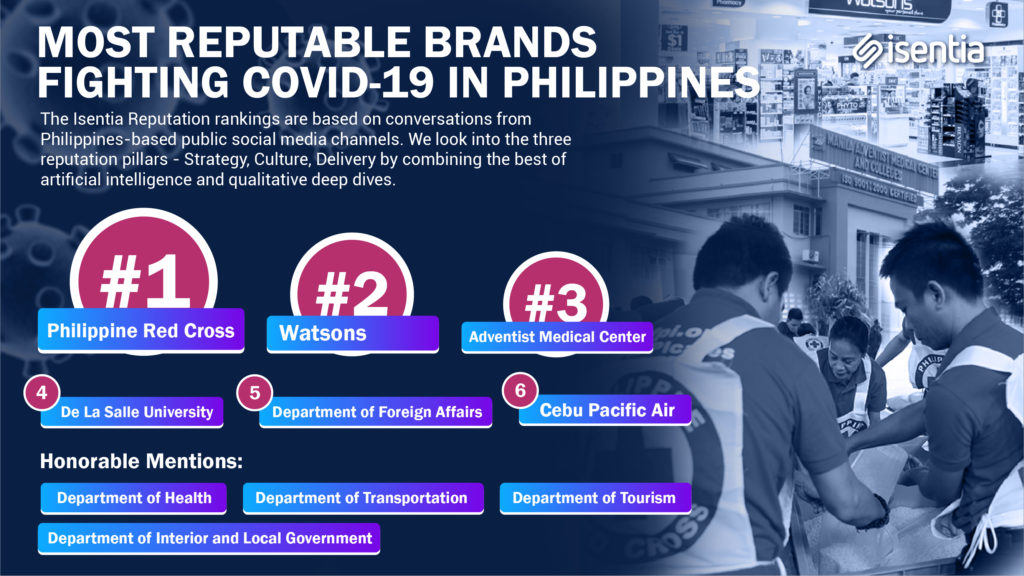Blog
The fundamentals of stakeholder strategy
A practical guide to tailored stakeholder management, offering strategies and tools to identify, map, and nurture relationships.

Manila, 3 March 2020 – Isentia, APAC’s leading media intelligence and insights specialist has released a list of ‘Most Reputable Brands in the Philippines fighting the COVID-19’.
The reputation rankings report uncovers how the netizens in the Philippines perceive brands across Strategy, Culture, Delivery – the three pillars of Isentia’s Reputation Framework.
The Philippine Red Cross topped the list of most reputable companies, followed by Watsons Philippines, Adventist Medical Center Manila and De La Salle University at second, third and fourth ranks, respectively. Various hospitals and government agencies were also among the top most reputable brands, with information dissemination their common denominator.
The Philippine Red Cross kept the public informed of developments and updates on COVID-19, with news channels cascading information from the agency in reports shared on social media. Such communications from the agency were well retweeted by netizens with the goal to spread information on the situation met on such activity.
Watsons Philippines leveraged well on its digital presence and campaigned for preventive and precautionary measures against the spread of the virus, particularly the availability of surgical masks as the country faced concerns on supply.
Hospitals – both private and public – were on top of the situation as they ensured protocols and monitored developing cases within their respective premises. The Adventist Medical Center bested others as it readily addressed and clarified that there was no patient affected with COVID-19 admitted in their unit. Other hospitals in the same favourable standing were East Avenue Medical Center, Pasig General Hospital, Makati Medical Center, The Medical City, and Asian Hospital.
De La Salle University took a proactive approach as it ensured safety measures such as temperature checks, travel restrictions of faculty and staff, and preparations of possible class suspensions. The university kept its community informed of updates and developments on the discussions on COVID-19.
Government agencies naturally made it to the list, being the first-line agents in addressing concerns on the spread of the virus. Honourable mentions were given to the Department of Foreign Affairs and the Department of Transportation as travel-related discussions on repatriation of OFWs proliferated. Other agencies mentioned included Department of Health, Department of Interior and Local Government and the Department of Tourism.
Lady Ochel Espinosa, Insights and Research Director, mentioned “Reputation has always been important to the media intelligence business from brands to end consumers. Reputation may be intangible, but this serves to be more relevant to achieve communication objectives in today’s connected digital publics which in essence monitors everything and overlooks nothing, especially in the advent of a crisis such as the COVID-19 or the novel coronavirus”.
For this study, six weeks’ worth of data was harvested and processed from a total of 9k+ Philippines-based public social media channels. Posts were tagged into three reputation pillars and its fifteen sub-attributes through machine learning, contextual assessments and qualitative deep dives.
About Isentia
Our mission is to monitor, analyse and create actionable insight from complex communications across the Asia-Pacific. With powerful technology and talent, we deliver what’s relevant when clients need it, driving decisions and opening possibilities.
We employ over 1,000 of the best and brightest across 12 markets with a vision to empower clients to make impactful decisions, every time. With more than 30 years of experience working with the biggest brands across Asia-Pacific, we continue to be curious and were listed on the Australian Financial Review’s 50 Most Innovative Companies in the past. We have been awarded company of the year consecutively four times by AMEC – the world’s largest media intelligence and insights professional organisation.
Contact
To learn more about Reputation Analysis or to obtain a copy of the full report, please contact
Ivan Chua
Regional Marketing Manager, Asia
+65 6593 9880
ivan.chua@isentia.com
This is the “wpengine” admin user that our staff uses to gain access to your admin area to provide support and troubleshooting. It can only be accessed by a button in our secure log that auto generates a password and dumps that password after the staff member has logged in. We have taken extreme measures to ensure that our own user is not going to be misused to harm any of our clients sites.
A practical guide to tailored stakeholder management, offering strategies and tools to identify, map, and nurture relationships.
Across the communications landscape, teams are being asked to do more with less, while staying aligned, responsive and compliant in the face of complex and often shifting stakeholder demands. In that environment, how we track, report and manage our relationships really matters. In too many organisations, relationship management is still built around tools designed for […]
Get in touch or request a demo.